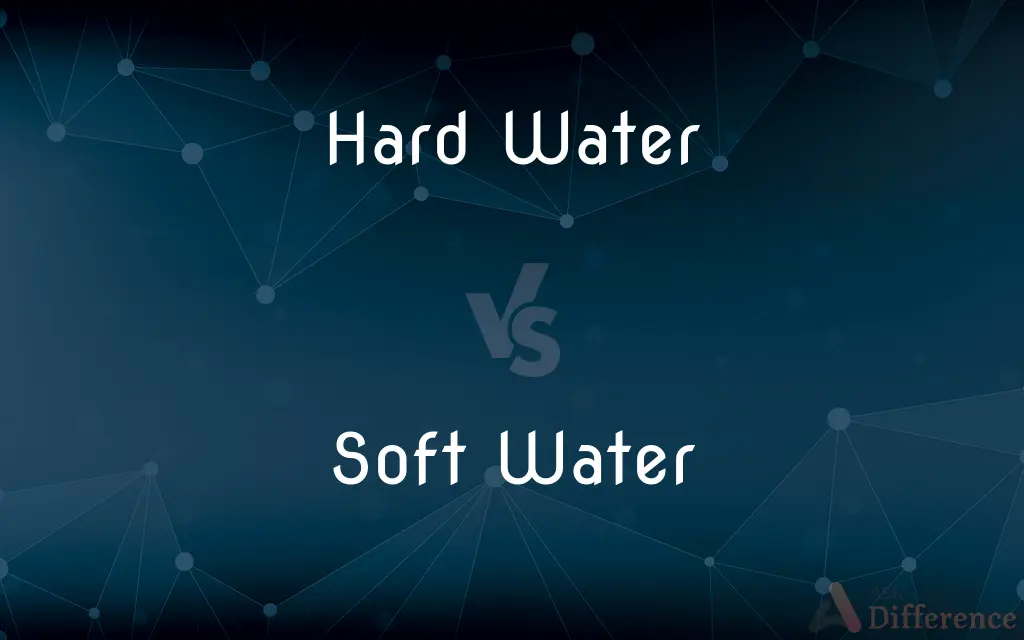Hard Water vs. Soft Water — What's the Difference?
By Tayyaba Rehman — Published on January 17, 2024
Hard water contains high levels of minerals like calcium and magnesium, while soft water has lower mineral content, often treated to remove these minerals.

Difference Between Hard Water and Soft Water
Table of Contents
ADVERTISEMENT
Key Differences
Hard water is characterized by its high mineral content, primarily calcium and magnesium. These minerals are dissolved in the water as it passes through limestone and chalk deposits. Soft water, in contrast, contains minimal amounts of these minerals. It’s often naturally occurring, especially in areas where water moves through peat or igneous rocks, or it can be the result of water treatment processes.
In terms of household use, hard water often leads to the buildup of limescale in appliances like kettles and boilers and can make soap and detergent less effective, resulting in less lather. Soft water is more efficient for cleaning purposes as it produces more lather with soap and detergent and doesn’t leave mineral deposits in appliances and on surfaces.
The taste of water can also be affected. Hard water tends to have a slightly metallic taste due to the minerals, while soft water is often considered to have a neutral or even slightly salty taste, especially if it has been treated with ion-exchange resins.
From a health perspective, the minerals in hard water can have benefits, contributing to dietary intake of calcium and magnesium. Soft water, having low mineral content, doesn’t provide these benefits but is less likely to contain contaminants that bind to these minerals.
Plumbing systems can also be impacted differently. Hard water can cause scale buildup in pipes, reducing their efficiency over time, while soft water, being less corrosive, is gentler on plumbing systems.
ADVERTISEMENT
Comparison Chart
Mineral Content
High in calcium and magnesium
Low mineral content
Household Effects
Causes limescale, reduces soap effectiveness
More effective for cleaning, no limescale
Taste
Slightly metallic due to minerals
Neutral or slightly salty
Health Benefits
Provides dietary minerals
Fewer minerals, but less likely to have contaminants
Plumbing Impact
Can cause scale buildup in pipes
Gentler on plumbing systems
Compare with Definitions
Hard Water
Plumbing Challenges: May lead to pipe scaling.
We installed a water softener to combat the hard water’s effect on our pipes.
Soft Water
Less Limescale Formation: Doesn’t leave mineral deposits.
We don’t get limescale buildup in our kettle with soft water.
Hard Water
Limescale Formation: Prone to leaving limescale residues.
Our kettle frequently has limescale buildup due to hard water.
Soft Water
Low Mineral Content: Minimal calcium and magnesium.
Soft water is gentle on our skin and hair.
Hard Water
High Mineral Content: Contains significant calcium and magnesium.
Hard water causes white deposits on my showerhead.
Soft Water
Better Cleaning Efficiency: Improves soap and detergent effectiveness.
Soft water helps our clothes get cleaner in the wash.
Hard Water
Impacts Soap Efficiency: Makes soap less effective.
It's hard to get a good lather because of the hard water.
Soft Water
Neutral or Salty Taste: Can taste slightly salty if treated.
The soft water from our treatment system tastes slightly different than tap water.
Hard Water
Metallic Taste: Can have a slightly metallic flavor.
The hard water from our tap has a distinct metallic taste.
Soft Water
Gentle on Plumbing: Reduces the risk of pipe scaling.
Our plumbing has had fewer issues since we switched to soft water.
Common Curiosities
Is it safe to drink soft water?
Yes, soft water is generally safe to drink.
Can hard water damage appliances?
Over time, the mineral buildup can reduce the efficiency of appliances like washing machines.
Can you taste the difference between hard and soft water?
Many people can taste the difference due to the mineral content.
Is softening hard water necessary?
It's not essential but can help protect appliances and make cleaning easier.
Can hard water affect hair and skin?
Yes, it can leave residues that make hair dull and skin dry.
Are there environmental concerns with water softeners?
Yes, the salt and water used in regeneration can have environmental impacts.
Does hard water have health benefits?
Yes, the minerals in hard water can contribute to dietary needs.
Can you naturally soften hard water?
Boiling can precipitate some minerals, but a water softener is more effective.
Does hard water affect laundry?
Yes, it can make detergents less effective and leave clothes looking dingy.
Is bottled water hard or soft?
It varies by brand, but most bottled water is relatively soft.
Does soft water contain sodium?
Yes, ion-exchange softeners add a small amount of sodium to the water.
How do you test for hard water?
Water hardness test kits are available for home use.
Can soft water help with eczema?
Some people find that soft water irritates their skin less than hard water.
Are water softeners expensive to maintain?
Maintenance costs can vary but generally include salt replacement and occasional servicing.
Does boiling water make it softer?
Boiling can remove some hardness, but not all types.
Share Your Discovery

Previous Comparison
Megaloblastic Anemia vs. Pernicious Anemia
Next Comparison
Case Study vs. SurveyAuthor Spotlight
Written by
Tayyaba RehmanTayyaba Rehman is a distinguished writer, currently serving as a primary contributor to askdifference.com. As a researcher in semantics and etymology, Tayyaba's passion for the complexity of languages and their distinctions has found a perfect home on the platform. Tayyaba delves into the intricacies of language, distinguishing between commonly confused words and phrases, thereby providing clarity for readers worldwide.












































